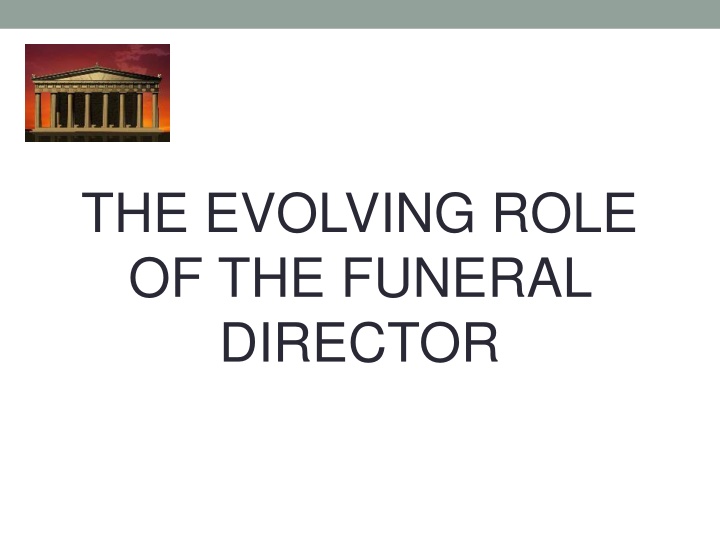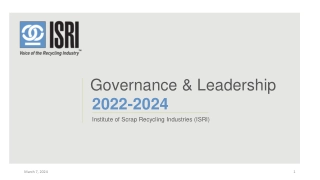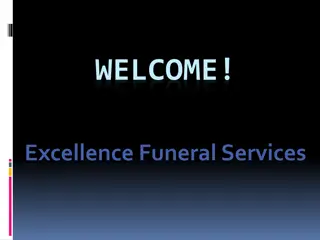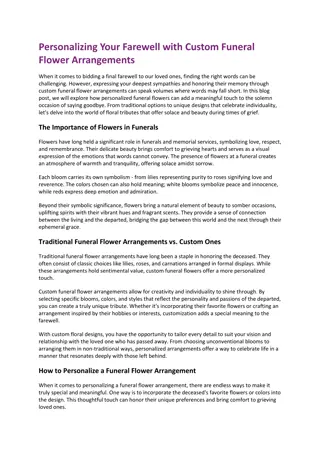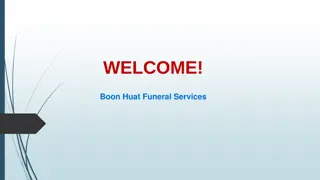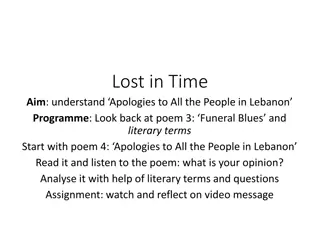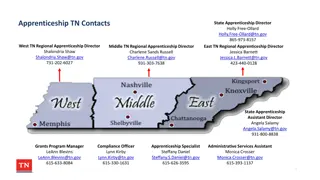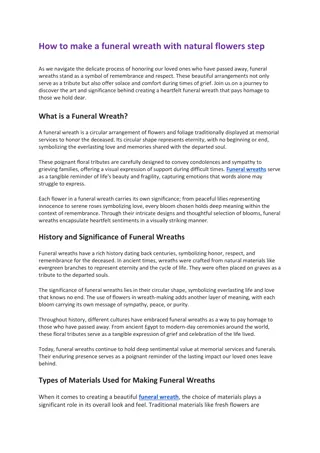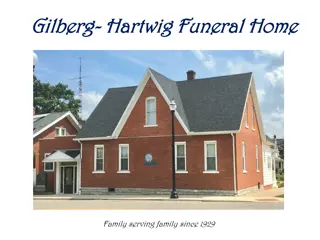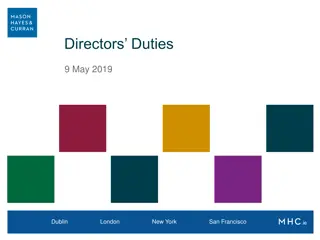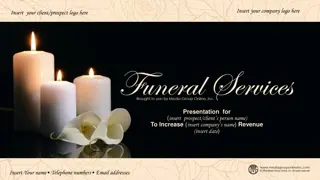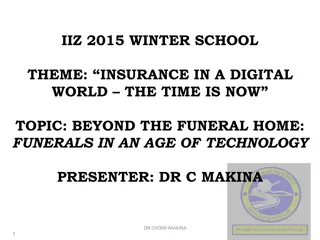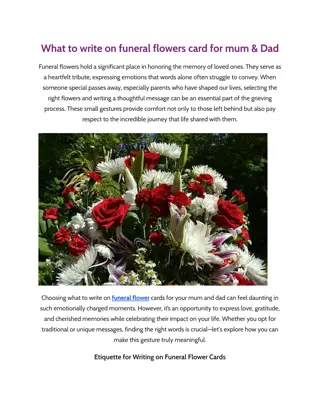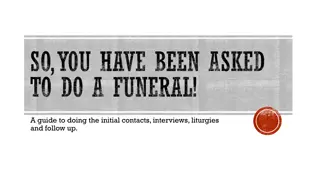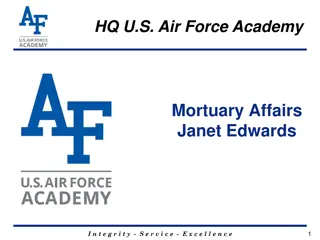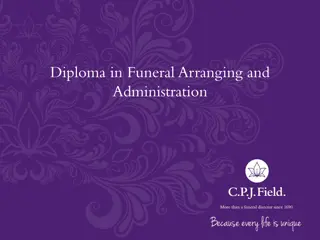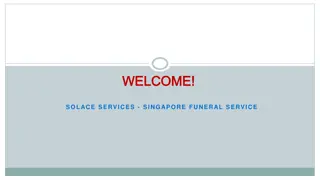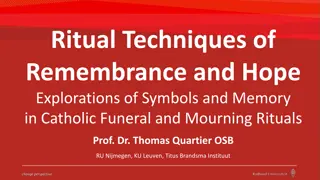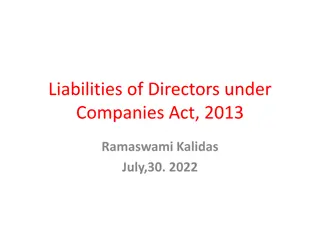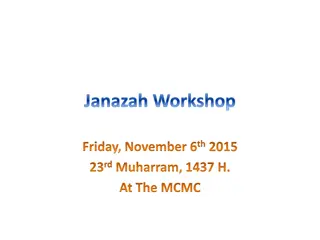The Evolving Role of Funeral Directors in the UK
Explore the changing responsibilities of funeral directors in the UK, from technical advisers to custodians of the deceased, agents, master of ceremonies, and contractors. Understand the importance of professionalism, environmental regulations, technological advancements, and future disposal methods for the deceased in the funeral service industry.
Download Presentation

Please find below an Image/Link to download the presentation.
The content on the website is provided AS IS for your information and personal use only. It may not be sold, licensed, or shared on other websites without obtaining consent from the author.If you encounter any issues during the download, it is possible that the publisher has removed the file from their server.
You are allowed to download the files provided on this website for personal or commercial use, subject to the condition that they are used lawfully. All files are the property of their respective owners.
The content on the website is provided AS IS for your information and personal use only. It may not be sold, licensed, or shared on other websites without obtaining consent from the author.
E N D
Presentation Transcript
THE EVOLVING ROLE OF THE FUNERAL DIRECTOR
1 Understand the evolving role of the funeral director within the UK. 2 Understand the importance of presenting a holistic and professional image of funeral directing. 3 Understand any environmental regulation and their impact on the funeral service. 4 Understand how the use of technology is impacting upon the funeral service. 5 Understand the developing range of proposed methods for future disposal of the deceased.
Understand the evolving role of the funeral director within the UK. 1. Technical Adviser Following a death, the bereaved turn to the Funeral Director for guidance, seeking the benefit of his or her knowledge and experience. Familiarity with regulations, statute law, local bye-laws, rites ,procedures and options available, all form part of the advice a Funeral Director must be able to offer those they are called upon to serve, treating all information, however gained, as strictly confidential.
2. Agent As an agent the Funeral Director liaises between the bereaved and the various organisations providing the services required. It is therefore essential that the Funeral Director has a comprehensive knowledge of what they are selling in the role of agent.
3. Custodian of the Deceased As custodian of the deceased, the Funeral Director fulfils their primary role. The funeral profession essentially centres on the deceased. Being entrusted with the care of the body until the time of the funeral is a responsible task, calling for technical knowledge as well as the provision of adequate and proper facilities. The Funeral Director should understand the process of embalming and if not a practitioner of the science, should at least be able to describe fully its advantages.
4. Master of Ceremonies The Funeral Director assumes the role of Master of Ceremonies on the day of the funeral. The ritual or ceremony of the funeral is extremely important and often is a complex operation involving many individuals and organisations. It is therefore incumbent on the Funeral Director to liaise with all those involved to ensure that the funeral is carried out according to the wishes and instructions of the family and that he or she is seen to be a team leader who is dignified, calm and efficient.
5. Contractor When a family or an individual places an order for a funeral, they enter into a contract. Legal history shows that the person who actually places an order is liable for payment of the ensuing account. For this reason it is essential that clients are made fully aware of the services they are receiving.
Future Role of the Funeral Director Living in a multi-cultural society, the need to take proactive action to fully understand and embrace the range of cultural traditions and associated funeral rites will equip funeral directors with the knowledge and skills required to assist most clients.
Traditionalist 1927 -1945 CHARACTERISTICS AND TRAITS LOYAL TO THE BUSINESS RESPECT THE AUTHORITY DEDICATION AND SACRIFICE DUTY BEFORE PLEASURE INDIRECT IN COMMUNICATING DEMONSTRATE OBEDIENCE RESPOND WELL TO BEING TOLD WHAT TO DO SENIORITY AND AGE CORRELATED ADHERENCE TO RULES
Baby Boomers 1946-1964 CHARACTERISTICS AND TRAITS SEE THE BIGGER PICTURE WIDER CONTEXT OF MOST SITUATIONS BRING FRESH PERSPECTIVES LITTLE RESPECT FOR TITLE DISAPPROVE OF STRUCTURE OPTIMISTIC CRAVE PERSONAL GROWTH SENSITIVE TO FEEDBACK HEALTH AND WELLNESS PERSONAL GRATIFICATION
Generation X 1965 -1980 CHARACTERISTICS AND TRAITS POSITIVE ATTITUDE IMPATIENCE GOAL ORIENTATED MULTI-TASKING THINKING GLOBALLY SELF-RELIANCE INFORMAL/CASUAL WORK JUST A OTHER JOB / BUSINESS ATTITUDE TECHNO-LITERAL BALANCE NEED A LOT TO DO AND FREEDOM TO DO IT THEIR WAY WILL QUESTION AUTHORITY DEMAND CHOICE
Generation Y Millennial 1981 - 2000 CHARACTERISTICS AND TRAITS CONFIDENCE SOCIABILITY DECREASE IN MORALITY LIVE DIVERSITY TENACITY TECHNOLOGICAL SAVY MULTI-TASKING NEED FLEXIBILITY DEMANDING DON T RESPOND WELL TO BEING TOLD WHAT TO DO THRIVE ON COMMUNICATION VIA SOCIAL MEDIA
Traditionalist Baby Boomers Generation X Generation Y Millennial CHARACTERISTICS AND TRAITS
The Principles of Professional Behaviour Funeral Directors should demonstrate professional and ethical behaviour with clients, and in the handling and caring for the deceased at all times. Clients are entitled to expect that all members and their employees will demonstrate an acceptable level of care and respect. This includes:-
? Safe, dignified and respectful care of the deceased ? Un-biased and ethical verbal and non-verbal behaviour ? Sharing of objective and professional advice, based on up to date funeral service knowledge and professional judgement.
? Members and their employees must not under any circumstances allow any personal views or prejudice about the deceased, or the client impact on the level of care or service provided. ? Avoidance of personal views and prejudice applies to:- ? cultural background ? disability ? race, ethnic or national origin ? gender ? lifestyle ? marital or parental status ? religion or belief
Working with colleagues in the Funeral Service Professional and ethical behaviour also extends to respecting the views, skills and contributions of workplace colleagues, and other related professionals. Members and their employees are also expected to be able to demonstrate unity and respect for the diversity of employees involved in any aspect of providing a professional service on behalf of the client
Professional and ethical behaviour in the workplace extends to showing respect for employees irrespective of:- o cultural background o competence and ability o race, ethnic or national origin o gender o lifestyle o marital or parental status o religion or belief o sexual orientation
There are emblaming products available that do not have damaging ingredients and unpleasant effects on the planet or ourselves, however, the efficiency of these alternatives is such that most funeral directors find themselves with a straight choice between embalming and refrigeration.
When choosing the following points should be considered : How long is it necessary to wait before providing the funeral? Does the client wish to view the deceased? Is the deceased to be buried in a cemetery where there are restrictions on the use of formalin based embalming fluids? Embalming fluid is an unpleasant substance before it is used to embalm. Does it remain like that once it is has performed the tissue fixing task for which it was injected into the body? Refrigerant gases are not thought to be good for the environment, what happens to them when they are replaced? How much energy does it take to keep a refrigerator at the required temperature for safe body storage?
THE OTHER FACTORS THE COFFIN THE FLOWERS
See Resomation Power Point Presentation
